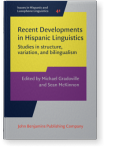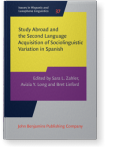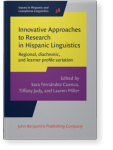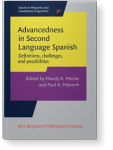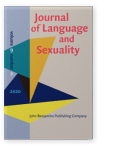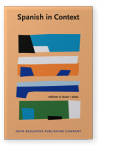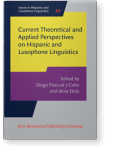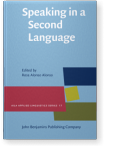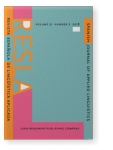Matthew Kanwit
List of John Benjamins publications for which Matthew Kanwit plays a role.
Book series
2023 Chapter 10. Variable outcomes abroad: Exploring the role of pre-program proficiency in the development of Spanish future-time expression Study Abroad and the Second Language Acquisition of Sociolinguistic Variation in Spanish, Zahler, Sara L., Avizia Y. Long and Bret Linford (eds.), pp. 292–320 | Chapter
Empirical research has reported differential effects of proficiency level on acquisition in the study-abroad (SA) context. We tested whether pre-SA proficiency influences learners’ acquisition of variable structures during SA, analyzing Spanish future-time expression, a structure conveyed… read more
2023 Chapter 3. Exploring future-in-the-past variation in Seville and Caracas: ¿Cambiaría o Iba a Cambiar? Innovative Approaches to Research in Hispanic Linguistics: Regional, diachronic, and learner profile variation, Fernández Cuenca, Sara, Tiffany Judy and Lauren Miller (eds.), pp. 58–80 | Chapter
Research on Spanish future-time expression has revealed a diachronic rise for the periphrastic future. However, future-in-the-past expression remains understudied. Two common variants are the periphrastic future in the imperfect (e.g., iba a bailar ‘I was going to dance’) and the conditional (e. read more
2021 Chapter 6. Allowable temporal distances for future-time forms: The case of advanced L2 Spanish learners Advancedness in Second Language Spanish: Definitions, challenges, and possibilities, Menke, Mandy R. and Paul A. Malovrh (eds.), pp. 115–142 | Chapter
Learners may show sensitivity to linguistic factors in more controlled tasks before doing so in production, although advanced learners often demonstrate greater inter-task consistency. Future-time expression in Spanish serves as a good test case for such variability due to the multiple forms… read more
2020 Menos masculino, demasiado infantil: How age and gender ideologies index sexuality in diminutive perception in Madrid Spanish Journal of Language and Sexuality 9:2, pp. 127–151 | Article
Age is an under-analyzed variable in linguistic research concerning gender and sexuality. We consider these three constructs by examining diminutives as an index of gay sexuality in Madrid Spanish across two tasks. Although phonetic cues have received great attention, morphological features (e.g.… read more
2020 Are the systems the same? Applying the comparative method to variable intensification in the Spanish and Catalan of Tarragona, Spain Spanish in Context 17:1, pp. 58–83 | Article
Although two languages in contact may contain similar structures, superficial structural similarities may abscond important differences. The comparative method critically determines whether the languages differ in relative rates of variant use, the significance of independent variables,… read more
2020 Chapter 12. Proposing a tripartite intensifier system: Re, muy, and bien in Buenos Aires and Tucumán, Argentina Current Theoretical and Applied Perspectives on Hispanic and Lusophone Linguistics, Pascual y Cabo, Diego and Idoia Elola (eds.), pp. 253–272 | Chapter
Tripartite systems demonstrate how a dominant form coexists with other variants without any falling into disuse, as each occupies a particular space (Kapatsinski, 2009). Intensifiers reveal language change through rapid variability and recycling in popularity (Tagliamonte, 2008), as seen in… read more
2018 Chapter 1. Sociolinguistic competence and the acquisition of speaking Speaking in a Second Language, Alonso, Rosa Alonso (ed.), pp. 1–24 | Chapter
In face-to-face spoken interactions, language learners must construct a meaningful message consistent with the L2 grammar, articulate it comprehensibly, and manage the aspects of oral communication that reflect speaker identity, interlocutor identities, and the characteristics of the… read more
2018 Variable past-time expression across multiple tasks in Tucumán, Argentina Revista Española de Lingüística Aplicada/Spanish Journal of Applied Linguistics 31:2, pp. 605–637 | Article
We examine variable past-time expression in urban Tucumán, Argentina, an understudied region representative of the set of Andean varieties included in Northwestern Argentinean Spanish. We analyze the present perfect (PP) and preterit in two contexts of data collection: a sociolinguistic… read more
